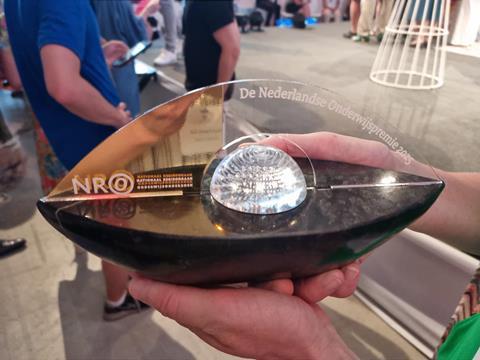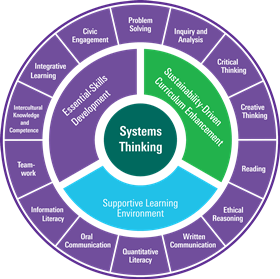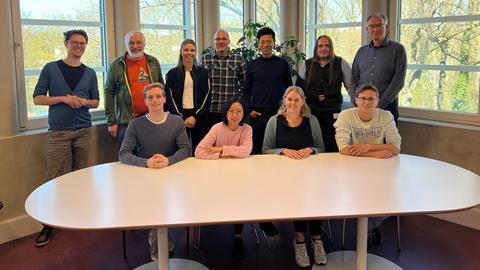The CLEAR initiative at the University of Twente won the Dutch Education Award 2025. The jury was impressed by the systems thinking approach, which creates chemists that are well-suited for the challenges of tomorrow. So, what’s next?
Since our 2023 interview with associate professor Albert Wong and programme director Leonie Krab-Hüsken, the systems thinking approach at the University of Twente’s Chemical Sciences & Engineering (CSE) programme has evolved to include three pillars: essential skills development, sustainability-driven curriculum enhancement and a supportive learning environment. The resulting CLEAR initiative (Chemistry Learning for Environmental Action and Responsibility) won the Dutch Education Award 2025.
Krab-Hüsken: ‘The pillars are an important part of the proposal that won the award. Essential skills development focuses on things like writing, teamwork, problem solving, and other general competences that are not chemistry-related.’ The sustainability-driven enhancement pillar looks at the chemical side from classical and innovative points of view, as well as life cycle assessments and other aspects. The third pillar is creating a supportive learning environment. ‘We want to create a safe place where students can make mistakes and explore. The core of systems thinking is supported by these pillars.’

Bigger picture
‘We started with teaching essential skills, and gradually over the years, we introduced systems thinking and more focus on sustainable chemistry’, says Wong. And they did it all without any funding, driven purely by their passion for teaching. ‘We established these pillars in our own areas of expertise, and they became a unified whole when we came together. The bigger picture we envisioned was realised in uniting and winning this award.’ Linlin Pei, educational consultant at UTwente, adds, ‘Connecting our different initiatives and efforts strengthened the proposal. We approached it more systematically.’
The initiative receives €1.2 million with the award. Though nothing is set in stone yet, the team has some ideas on how to put the funding to good use. These include improving the initiative, exploring and researching the methods further, and extending the programme beyond the CSE program, to other faculties, universities, and even high schools. The hope is to bridge secondary and higher education by preparing the next-generation chemistry student for systems thinking and real-world problems.
Role-playing
‘Without this kind of systems thinking framework, it is difficult to grasp the complexity involved in building a hydrogen plant, for example’, says Assistant Professor Arturo Susarrey Arce. ‘You would not only have to consider the chemistry, but also factors such as where to place the plant, what the surface is like, which people or villages are involved and what the economic impact would be. With this initiative, we want to train students to approach these problems realistically.’

Pei provides an example. ‘In our course, students need to think about a technical solution for certain materials. What they don’t know beforehand is that they will be divided into groups at the end of the module and assigned different roles to discuss the project from different perspectives.’ These roles could be a business representative, a mayor, environmentalists, a community member or a chemist, for example. ‘When you act out these roles, you start to realise the pros and cons of certain solutions, and that it’s essential to work together to reach an agreement that works for everyone. This demonstrates how reality works. You could have amazing ideas, but you have to collaborate with others to implement them.’
‘It’s almost like role-playing’, notes Krab-Hüsken. ‘When they are assigned the role of shareholder, students puff out their chests and act more seriously, which is very different from the role of community member.’ And it can get heated or emotional, too, says Pei. ‘Furthermore, we have quite a few international students, who offer interesting insights from different parts of the world.’ While Dutch students assume that some things ‘just work’ in all environments, discussing issues with students from other countries reveals that it is much more complicated. ‘That was exactly what we hoped for. Sustainability is a complex, global challenge, and we need each other to tackle it.’
Chemistry as solid foundation
The beauty of the approach is that it can also be applied to other disciplines, such as medicine, law and economics. ‘The world is full of complex systems’, says Krab-Hüsken. It also helps that it is an evidence-based approach; the team has published a number of research papers. Pei continues, ‘That is also what motivates us. There is something tangible to hold on to, and this attracts more and more colleagues from Twente and other universities to join us.’
According to Wong, it is important to note that the CLEAR initiative was developed specifically to educate chemists. ‘I really felt that chemists needed to think in systems; they are so essential in addressing major global challenges. We could have started much more broadly, but the goal would have become too vague. Chemistry is our solid foundation, and from this discipline we can take off.’
The team was surprised to receive support from so many different quarters. ‘We weren’t aware that it would resonate with so many people’, says Wong. ‘Receiving this award is very rewarding , not just for us or the University of Twente – considering the budget cuts – but for the Netherlands as a whole.’
The team that received the award consists of many more than the ten people who were called to the stage. ‘Ten was the maximum number of people that could apply as a team, but many, many more people were involved’, says Wong. ‘We are also very grateful for the help and input from our students’, adds Pei. The CLEAR team hopes that this prize and recognition will help the CSE programmes (BSc and MSc) at University of Twente to attract more students in the future. All of the details of the proposal are available online, and the team suggests that others will use it and share their experiences with them.













Nog geen opmerkingen